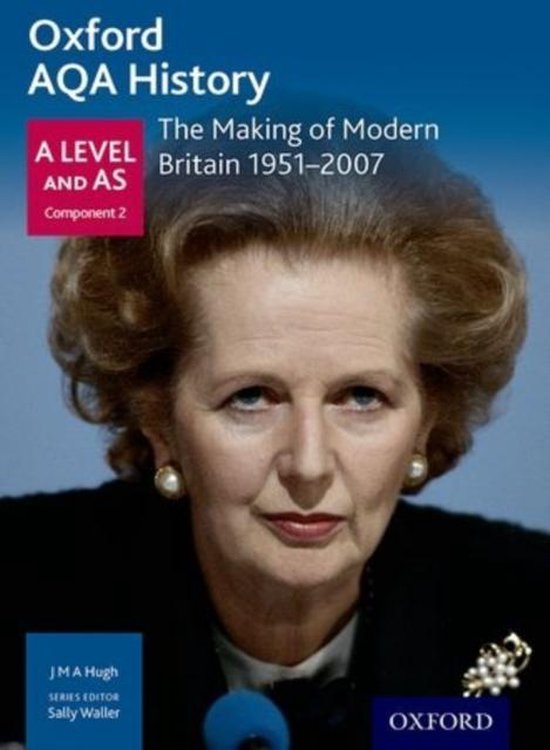Contents of the Study Guide:
Part one: Building a new Britain, 1951-79
1. The Affluent Society, 1951–1964
2. The Sixties, 1964–1970
3. The end of Post-War Consensus, 1970–1979
Part two: Modern Britain, 1979–2007
4. The impact of Thatcherism, 1979–1987
5. Towards a new Consensus, 1987–1997
6. The Era of New Labour, 1997–2007
,Part one: Building a new Britain, 1951-79
1. The Affluent Society, 1951–1964
Content:
1.1 Conservative governments and reasons for political dominance
(o, p. 1-6; l. p.21-30)
Essays: Neither Churchill nor Eden were effecctive political leaders in the years 1951 to 1956.
The Conservtive Party lost the 1964 election because they were outdated and out of touch with the
electorate.
‘The Suez crisis was a result of Eden’s misunderstanding of Nasser’s motives.’ Agree?
How far do you agree that the Conservatives stayed in power due to Labour weakness?
Sources: reasons why the Labour Party was unable to challenge the Conservative Party’s political
dominance between 1951-1964.
The Churchill Government (1951-1955)
The Eden Government (1955-1957): a man in a hurry
The Macmillan Government (1957-1953): Supermac
The Sir Alec Douglas-Home Government (1957-1953): Estonian
Labour divisions (1951-1964)
(o, p.7-8, l, p. 57-60)
Reasons for the Conservatives fall from power
(o, p.9-10, l, p.53-56)
1.2 Economic developments 1957-1964
(o, p.12-18, l. p.32-36)
Sources: the success of the British economy between 1951-1964
Essay: The Conservative Party won the elections because of the voters’ growing presperity.
Economic problems
Stop-Go
Planning
1.3 Social developments
(o, p.19-28, l, p.37-45)
Sources: the impact of social change in the period 1951-1964
Essays: The decline in deference (polite submission and respect) was the most significant social change in
the period. Agree?
To what extent was the rise in standards of living in Britain in the 1960s the result of government policies?
The extent of affluence
Living standarts under the Conservatives: consumerism
Class
Changing attitides and social tensions
Immigration and social violence
A ‘youth subculture’
The status of women
,1.4 Foreign relations
(o, p.29-38, l, p.46-53)
Sources: British foreign policy objectives between 1951-1964 (ox, p.38)
Sources (l, p.62-64): why France vetoede Britain’s application to join the EEC
Difficulties that confronted Macmillan’s governement in framing a policy towards the EEC between 1960-
1963.
Essays: How important is President de Gaulle in explaining Britain’s exclusion from the process of European
integration between 1951 and 1963?
It was the weakness of its own economy that led Britain to apply to join the EEC in 1963. Assess.
Suez Crisis, Eden’s ‘mad venture’
(l, p.24-28)
Macmillan and the end of the empire
Britain’s relations with Europe
, 1.1 Conservative governments and reasons for political
dominance
The Churchill Government (1951-1955)
What legacy of Attlee’s government was continued? Why?
Continuation of consensus
‘Butskellism’: the left of the Conservatives and the right of Labour ‘tried to govern from the centre’
-> belief that this position would receive the most support from the electorate.
R.A. Butler, who was the key figure in the Conservative government instead of old and ill Churchill,
continued Labour’s aims of:
● Committing Britain to heavy defence programme (Korean War)
-> Britain relied on America and did not want to lose her support
-> desire to remain a ‘world player’
… contributed to the economic crisis
● Developing nuclear weapons programme
-> desire to remain a ‘world player’
… contributed to the economic crisis
… a point of division in the government and Labour
● State-directed planning of economy (rejected ROBOT) and acceptance of Keynesian approach
○ 1947 paper: accepted that Britain should have mixed economy
-> gain support of trade unions, as they were received a legitimate role
… paved the way to future economic problems (e.g. ‘stop-go’), growth of union’s power
What were the successes of this government?
Commitment to build 300,000 houses per year End of Korean War in 1953
… popular domestic policy for the electorate … relief for the people
… strain on the economy
End of rationing in 1953 Steel industry was denationalised
promise of ‘more red meat’ was fulfilled … step away from the consensus? How big?
… one of the first policies of the government to
attract electorate
Test of the nuclear bomb in 1952 Coronation of Queen Elizabeth II in 1952 - a new
… strain on finances ‘Elizabethan age’
… continuation of the ‘world power’ image … great coincidence for the Conservatives - symbol
of a new, more prosper era
The Eden Government (1955-1957): a man in a hurry
What led to his failure in Suez (personal)?





